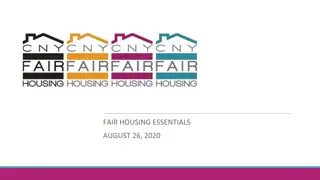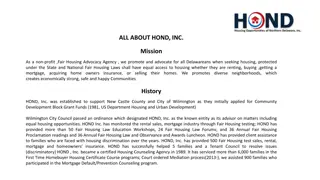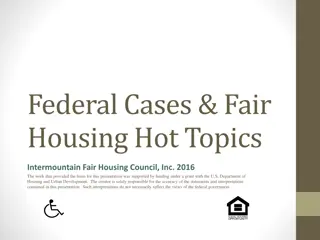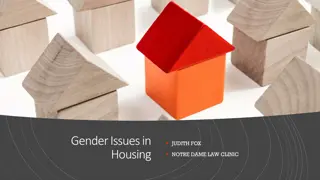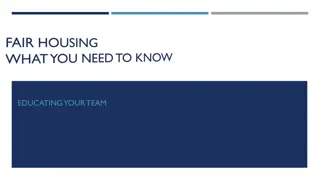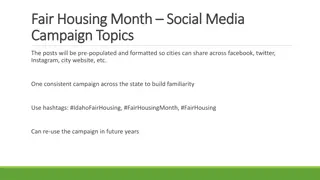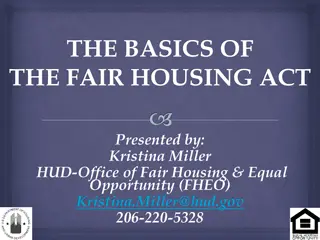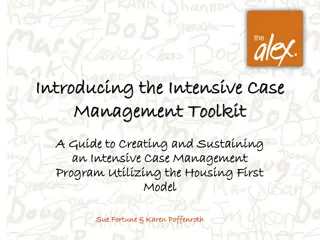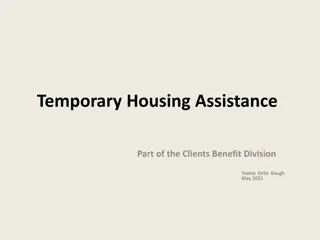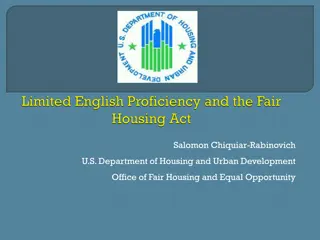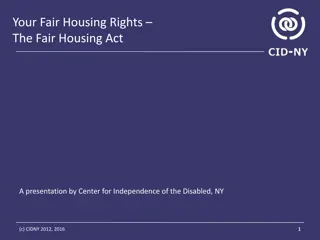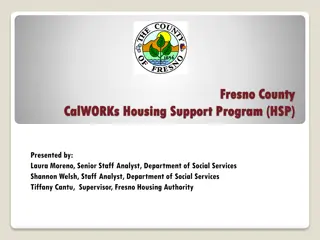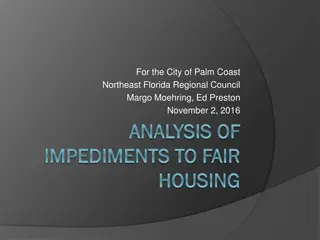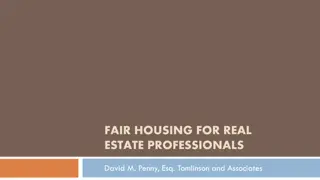Fair Housing Compliance Overview
Fair Housing laws prohibit housing discrimination based on protected classes. Noncompliance can lead to denial of civil rights and financial consequences. Discriminatory actions include refusal to rent or sell, applying different standards, and making discriminatory statements. Persons with disabilities are protected under the Fair Housing Act. Compliance is crucial for all involved in housing transactions.
Uploaded on Oct 01, 2024 | 0 Views
Download Presentation

Please find below an Image/Link to download the presentation.
The content on the website is provided AS IS for your information and personal use only. It may not be sold, licensed, or shared on other websites without obtaining consent from the author. Download presentation by click this link. If you encounter any issues during the download, it is possible that the publisher has removed the file from their server.
E N D
Presentation Transcript
IHFA FAIR HOUSING Information created by: David Penny, Esq. and Eric M. Steven, Esq. Presenter: Eric M. Steven, Esq.
Topics I. Overview of Concepts and Protected Classes II. Advertising III. Tenant Screening IV. Developing Non-Discriminating Rules V. Enforcing Rules in a Non-Discriminating Manner VI. Protecting Against Discrimination VII. Dealing with discovered discrimination
Fair Housing is About Civil Rights Fair Housing laws are federal, state, and local laws that prohibit housing discrimination. It is illegal to treat a person differently in a housing transaction because the person is a member of a protected class.
Why Make Fair Housing Compliance a Priority It s the law Noncompliance = Denial of Civil Rights Noncompliance is expensive
Discriminatory Actions Refusing to rent, sell, or finance/Denial of housing; Refusing to give information, discouraging from renting, or lying about availability; Applying different rules, privileges, standards, and/or qualifications; Eviction/Providing of Services; Making discriminating statement (spoken or published);
Discriminatory Actions, Cont. Steering to certain housing; Harassing, intimidating, threatening, or coercing; Refusing to let a person with a disability make modifications necessary to use the dwelling; Refusing to make reasonable changes in rules, policies, practices, or procedures so that a person with a disability can have equal use of the dwelling.
Fair Housing for Persons with Disabilities The Fair Housing Act protects individuals in all housing. Section 504 protects individuals with disabilities in publicly-funded housing. ADA protects individuals with disabilities in areas of a residential building that are open to the public, such as rental offices.
Disabled Tenants Applicants with disabilities cannot be asked questions about their disabilities. They can only be asked the same questions of all applicants; Any information an applicant with a disability gives their landlord about their disability must be kept confidential; Some tenants with disabilities may have special needs and require a reasonable accommodation or a reasonable modification
Fair Housing for Families with Children What does the phrase familial status mean? Familial status means having a child under age 18 in the household, whether living with a parent, a legal custodian, or their designee. It also covers a woman who is pregnant, and people in the process of adopting or gaining custody of a child.
Fair Housing for Families with Children What action does the law prohibit? No one may deny housing, limit access to housing, discourage home seekers, or create different rules, fees, or standards because of the familial status of the household. This includes rentals, purchases, lending, advertising, and any other transaction within the housing industry.
Fair Housing for Families with Children Does this mean that a landlord must rent to or cannot evict any household with children? No. A housing provider has the right to refuse rental applications or evict tenants based on objective criteria, such as credit history or bad tenant history. A housing provider should set criteria and apply them equally to each household whether it has children or not.
Fair Housing for Families with Children Can a landlord decide which units are better for families with children? No. Designating specific units for families with children is called steering and is illegal. Landlords should give applicants objective information about what is available and let applicants decide what unit is suitable for their household.
Familial Status When renting to families with children, be aware that occupancy standards can be different for children than adults Landlords cannot require children of different genders to have separate bedrooms. Keating Memo
Can a landlord discriminate against people who do not speak English? No. Typically, there is no legal requirement for private market landlords to provide translation for their tenants. Subsidized housing providers with a significant concentration of a specific national origin in proportion of the tenant population may require the Landlord to implement a Language Assessment Plan and a Limited English Proficiency Policy.
Domestic Violence Victims Sex discrimination in housing is illegal; Often housing providers have zero tolerance of violence policies; When those policies are used against victims of domestic violence, it may violate the Fair Housing Act, and/or VAWA Laws; Women are far more likely to be victims of domestic violence and not the perpetrators. As a result, zero tolerance policies may negatively affect women far more than men.
Stringent penalties for those found guilty of violating fair housing laws If landlord fails to comply with the laws, they may be faced with fines of up to $50,000; Ignorance of the laws is not a defense; All landlords are responsible for familiarizing themselves with fair housing laws; Landlords can select tenants on the basis of ability to: Pay rent on time; Take care of the rental property; Respect the rights of neighbors.
Advertising/Marketing Section 3604(c) of the Fair Housing Act makes it illegal to make, print or publish, or cause to be made, printed or published, any notice, statement or advertisement, with respect to the sale or rental of a dwelling, that indicates any preference, limitation or discrimination based on race, color, religion, sex, handicap, familial status or national origin, or an intention to make any such preference, limitation or discrimination. If it is found that a classified advertisement, display advertisement, insert or any other type of real estate advertisement is published with discriminatory language, the person or agency that placed the advertisement is liable, along with the publisher that printed the advertisement. Generally, a housing advertisement should describe the property itself, and not the potential occupant.
Primary Areas of Discrimination in Advertising Advertising that uses certain words, phrases, pictures, or other visual representations that are discriminatory. Using certain types of media as a means of discrimination Code words, catchwords, or catchphrases Color Familial status Handicap National origin Race Religion Sex or Gender
Primary Areas of Discrimination in Advertising Any photos, drawings, or symbols that may imply preference with respect to any of the above categories are prohibited. Describing the location by using potentially biased references. A reference to a known discriminatory facility must also be avoided Avoid using welcoming and inclusive terms, such as advertising that states specific groups are welcome. The use of the HUD fair housing logo and words to the effect that fair housing guidelines apply are the proper ways to say that all groups are welcome to buy or rent.
Housing for Older Persons Act (HOPA), exemption against familial status discrimination Housing communities for 55 or older housing. Housing Communities for Persons 62 years of age or Older. The regulations state that simply publishing that this is an adult community is not sufficient to meet this standard. Clear policies and procedures must be published and adhered to.
Marketing Summary Display Fair Housing posters in office Post Fair Housing policy Ensure advertising is Fair Housing Compliant Advertise attributes and amenities Don t advertise who you are looking for in a resident No steering when showing property Don t make assumptions about what an applicant may want or not want
Tenant Screening Develop written screening criteria for tenant applicants with application process description. Post the screening criteria at the office and on websites. Criteria should be provided to all applicants. Screening criteria should pertain to the applicant s past rental history, credit history, bankruptcy history, and criminal conviction history as permitted by state and/or federal law. Fair Credit Reporting Act HUD Guidance Memo of April 4, 2016 Source of income issues Screening criteria should inform the tenant of grounds for denial of the application. Screening criteria should be applied uniformly to all applicants
Tenant Screening Provide required notice of adverse action for conditionally accepted or denied applicants. Avoid Steering Keep track of and document criminal activity in the area where leasehold is situated to allow screening for such activity. Establish safeguards relative to screening process. Screening criteria should address: Belligerent/ Hostile Conduct; Incomplete Applications; Intoxication/Impairment; False/Misleading Answers. Establish a review process for denied applications. Keep good records of all inquiries and applications Use third party screening service for all rental applications Develop a formalized waiting list policy
Can a landlord require a social security number from a perspective tenant on an application? Using a social security number as part of a background check on a perspective tenant is considered a standard rental practice as long as the landlord requires a social security number from all perspective tenants. If a landlord is requiring social security numbers ONLY from tenants of a particular national origin, that would constitute a fair housing violation. Landlords should consider alternative forms of identification for individuals of Foreign National Origin
Acceptable Forms of ID Adults 18 and over MUST show valid identification from a list of Acceptable Forms of ID Children under 18 are not required to provide identification Forgot ID? The property manager and/or authorized agent may ask Tenant to complete a form to include name and current address, and may ask additional questions to confirm Tenant s identity
Acceptable Forms of ID Current driver s license or other state photo identity cards issued by Department of Motor Vehicles (or equivalent); U.S. Passport; U.S. Passport Card; DHS trusted traveler cards 9Global Entry, NEXUS, SENTRI, FAST) U.S. Military IF (active duty or retired military and their dependents, and DoD civilians; Permanent resident card; DHS-designated enhanced driver s license; Airline or airport-issued ID (if issued under a TSA-approved security plan); Federally recognized, tribal-issued photo ID; HSPD - 12 PIV card; Foreign government - issued passport; Canadian provincial driver s license or Indian and Northern Affairs Canada card; Transportation worker identification credential.
15 U.S. Code 1681c - Requirements relating to information contained in consumer reports Information excluded from consumer reports Except as authorized under subsection (b), no consumer reporting agency may make any consumer report containing any of the following items of information: Cases under title 11 or under the Bankruptcy Act that antedate the report by more than 10 years. Civil suits, civil judgments, and records of arrest that, from date of entry, antedate the report by more than seven years or until the governing statute of limitations has expired, whichever is the longer period. Paid tax liens which antedate the report by more than seven years. Accounts placed for collection which antedate the report by more than seven years. Any other adverse item of information which antedates the report by more than seven years
HUD Guidance on Use of Criminal Records (4/4/16) Introduction This guidance addresses how the discriminatory effects and disparate treatment methods of proof apply in Fair Housing Act cases in which a housing provider justifies an adverse housing action based on an individual s criminal history. Background As many as 100 million U.S. adults, or nearly one-third of the population, have a criminal record of some sort Across the United States, African Americans and Hispanics are arrested, convicted and incarcerated at rates disproportionate to their share of the general population
HUD Guidance on Use of Criminal Records Discriminatory Effects Liability and Use of Criminal History to Make Housing Decisions Policy violates the FHA when it has an unjustified discriminatory effect, regardless of intent When a policy has a disparate impact on particular individuals, it is unlawful if it is not necessary to serve a substantial, legitimate, nondiscriminatory interest of the housing provider, or if such interest could be served by another practice that has a less discriminatory effect Discriminatory effects liability is assessed under a three-step analysis. Evaluating Whether the Criminal History Policy or Practice Has a Discriminatory Effect In the first step of the analysis, a plaintiff must prove that the criminal history policy has a discriminatory effect National statistics may be used when state or local statistics are not readily available and there is no reason to believe they would differ markedly from the national statistics Nationally, racial and ethnic minorities face disproportionately high rates of arrest and incarceration Additional evidence may be relevant in determining whether local statistics are consistent with national statistics Regardless of the data used, determining whether a policy or practice results in a disparate impact is ultimately a fact-specific and case-specific inquiry
HUD Guidance on Use of Criminal Records Evaluating Whether the Challenged Policy or Practice is Necessary to Achieve a Substantial, Legitimate, Nondiscriminatory Interest In the second step of the discriminatory effects analysis, housing provider must prove that the challenged policy or practice is justified The interest proffered by the housing provider may not be hypothetical or speculative Some landlords and property managers have asserted the protection of other residents and their property as the reason for such policies or practices A housing provider must be able to prove that its policy or practice actually assists in protecting resident safety and/or property Exclusions Because of Prior Arrest A housing provider with a policy or practice of excluding individuals because of one or more prior arrests (without any conviction) cannot satisfy its burden of showing that such policy or practice is necessary to achieve a substantial, legitimate, nondiscriminatory interest Exclusions Because of Prior Conviction In most instances, a record of will serve as sufficient evidence to prove that an individual engaged in criminal conduct. But housing providers that apply a policy or practice that excludes persons with prior convictions must still be able to prove that such policy or practice is necessary to achieve a substantial, legitimate, nondiscriminatory interest. A housing provider that imposes a blanket prohibition on any person with any conviction will be unable to meet this burden. A housing provider must show that its policy accurately distinguishes between criminal conduct that indicates a demonstrable risk to resident safety and/or property and criminal conduct that does not. A policy or practice that fails to consider the nature, severity, and recency of criminal conduct is unlikely to be proven necessary to serve a substantial, legitimate, nondiscriminatory interest of the provider
HUD Guidance on Use of Criminal Records Evaluating Whether There Is a Less Discriminatory Alternative The third step of the discriminatory effects analysis is applicable only if a housing provider successfully proves that its criminal history policy or practice is necessary to achieve its substantial, legitimate, nondiscriminatory interest. In the third step, the burden shifts back to the plaintiff or HUD to prove that such interest could be served by another practice that has a less discriminatory effect. Individualized assessment of relevant mitigating information beyond that contained in an individual s criminal record is likely to have a less discriminatory effect than categorical exclusions that do not take such additional information into account. By delaying consideration of criminal history until after an individual s financial and other qualifications are verified, a housing provider may be able to minimize any additional costs that such individualized assessment might add to the applicant screening process. Statutory Exemption from Fair Housing Act Liability for Exclusion Because of Illegal Manufacture or Distribution of a Controlled Substance Section 807(b)(4) of the Fair Housing Act provides that the Act does not prohibit conduct against a person because such person has been convicted of the illegal manufacture or distribution of a controlled substance as defined in section 102 of the Controlled Substances Act (21 U.S.C. 802). A housing provider will not be liable under the Act for excluding individuals because they have been convicted of one or more of the specified drug crimes Section 807(b)(4) only applies to disparate impact claims based on the denial of housing due to the person s conviction for drug manufacturing or distribution Intentional Discrimination and Use of Criminal History A housing provider may also violate the Fair Housing Act if the housing provider intentionally discriminates in using criminal history information
Source of Income Discrimination The Tenant s Union of Washington State provides the following information on Tenant Discrimination: Discrimination against renters based on verifiable and legitimate sources of income is an unfair and discriminatory practice. Policies like no section 8 are a pretext for illegal discrimination and have a disparate impact on Washington s most vulnerable families. Renters who receive a verifiable source of legal income, such as social security, child support, SSI and section 8 vouchers (or any other governmental or non-profit subsidy) should not be automatically assumed to be unacceptable or undesirable renters. Limit income to rent quantifiers based upon the tenant s portion of rent. Eg. Applicants must have income in excess of three times the amount of the tenant s portion of rent.
Developing Non-Discriminating Rules Provide a core set of basic rules to all tenants. Post the rules in the office. Rules that set limits may be reasonable if they are based on realistic not exaggerated health and safety concerns. Rules should address behavior not status, and should not be so restrictive that families with children do not get equal use and benefit of the housing. Rules targeting or specifically directed at children are likely problematic. Know protected classes for potential claims Know what s prohibited Discriminatory Conduct Disparate Treatment Disparate Impact
Developing Non-Discriminating Rules Avoid unintentional violations Create clear, comprehensive, written neutral tenant rules Address Conduct not character Tenant Rules and Policies should address what will happen when violations occur. Address serious violations which endanger others, drugs, assaults, destruction of property. Address repeated minor violations. Consider Policies of progressive discipline Attempt compliance prior to termination if possible. Systems of lease violation warnings and opportunity to cure. Rules must be adequately communicated to the tenant Legible Leases and Rules Translation may be necessary
V. Enforcing Rules in a Non- Discriminating Manner
Enforcing Rules in a Non-Discriminating Manner Keep Activity Logs Discover, investigate, and document Rule violations. Investigate alleged rule violations Request third party verification of offenses Preserve evidence, information, and documentation gathered during investigation Issue written Notice authorized by State law- Serve Notices in accordance with State Law, avoid information and electronic means of communication with tenants Identify all written Policies when addressing tenant s violation of duties. Be specific in describing conduct in derogation of tenant duties including factual summary, name of persons involved, dates, and times of events. Uniformly apply written Policies to All offending parties. Enforce rules equally to all tenants Avoid disparate treatment and selective enforcement. Understand need to grant reasonable accommodation in terms and conditions when requested. Reconcile and follow all Lease, Federal, State, and Municipal Rules and Regulations through Policy enforcement.
Reasonable Accommodations Accommodations are requested for an exception to a housing provider s rule, policy, or practice. The individual with a disability must establish two things: The accommodation is necessary because of his/her disability, and The accommodation is necessary to access, maintain, or have full use and enjoyment of the housing.
Verification of Accommodation Request Housing providers can require individuals to provide a verification letter; Qualified professional; They are disabled and that their disability makes the requested accommodations necessary; A housing provider cannot require the release of medical records.
Reasonable Accommodations Develop a written accommodation request procedure Provide Fair Housing compliant accommodation request and verification form Designate an experienced individual with the company to oversee accommodation requests process and make determinations Incorporate an interactive process in accommodation review and response
Accommodations Tenants are responsible for requesting any accommodation from their landlord but the landlord cannot insist upon using a specific form(s). Request may be made verbally; Landlords may ask for verification that the request is disability related and necessary for the tenant by a qualified professional; If a structural modification of the dwelling is required, the tenant is ordinarily responsible for paying for it; If the landlord wants the dwelling converted back to its original state after the tenant moves out, the tenant may be required to do so.
Denial of an Accommodation or Modification Request A housing provider must consider any reasonable accommodation or modification requested; A request for accommodation can be verbal or in writing. Landlord cannot require a written request from the tenant; Must grant the request unless doing so would create an undue financial or administrative burden, or granting the request would fundamentally alter the nature of the landlord s business; It is better for the housing provider to suggest an alternative accommodation or modification. There must be an interactive dialogue before the landlord lawfully denies an accommodation request.
Reasonable Modifications Private-housing providers must allow individuals with disabilities to make structural changes so that the individual has full use of his/her residence. Private-housing providers can require the individual with a disability to pay for the costs of the modification; A publicly funded or subsidized housing provider may be obligated to pay for reasonable modifications; Housing providers have the right to request that modifications be done competently and with a permit, if the local jurisdiction requires a permit; Landlords can require tenants to remove interior modification after the tenancy, and landlords can require the tenant to pay for the costs to restore the unit to its original condition.
Individuals who Associate with Individuals with Disabilities Guests who have service or companion animals must be allowed to bring their animal onto the property when they visit. A housing provider cannot deny a mother housing because her child is disabled, regardless of whether her child with a disability would be living with her.
Protecting Against Discrimination Develop Internal Policy protocols Addressing: Advertising; tenant screening; lease up; work orders; inspections; rule enforcement; claim management; etc. Education and Training Landlord/Tenant Law Fair Housing Understand Limited English Proficiency Policy and Language Assessment Plan Foster an Environment of Inclusion Post Non-Discrimination Posters in offices Include written non discrimination statements in documents Auditing Internal audits for performance Outside Agency Testing Consult with counsel or housing experts early when situations arise. Be prepared to review case strategies with a flexible open minded perspective. Avoid entrenching in on one position.


